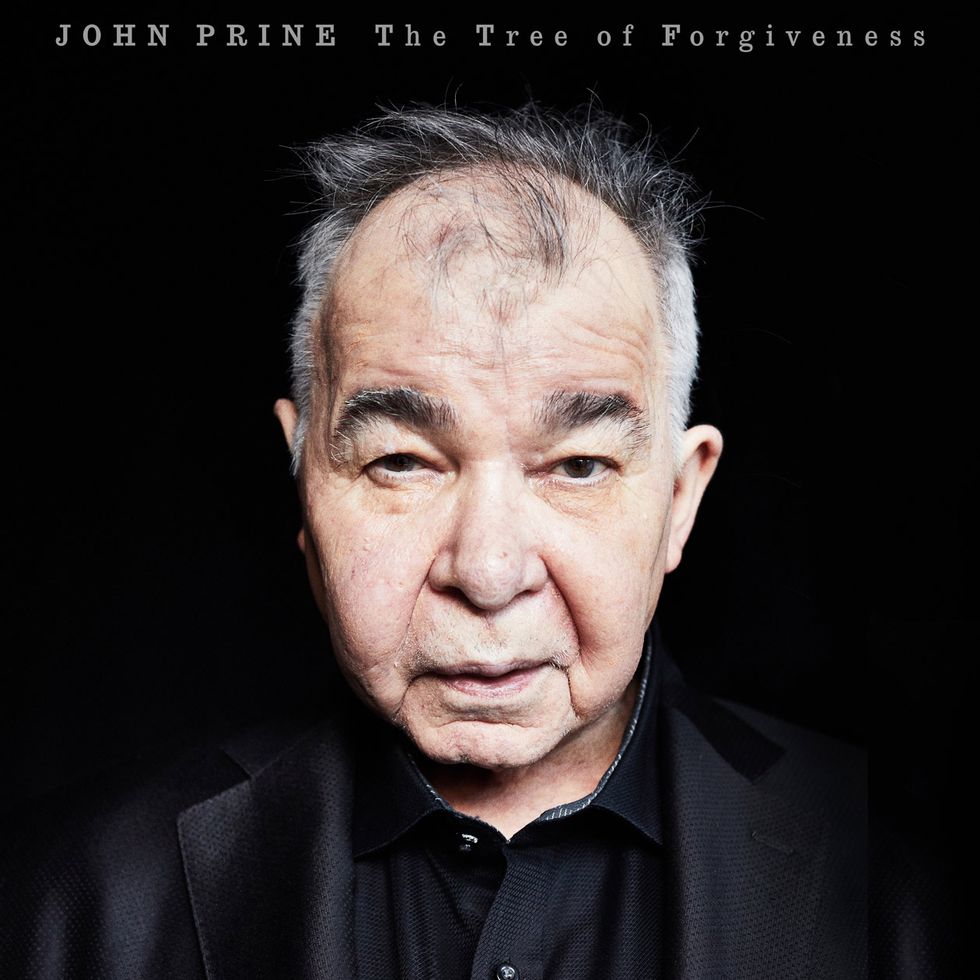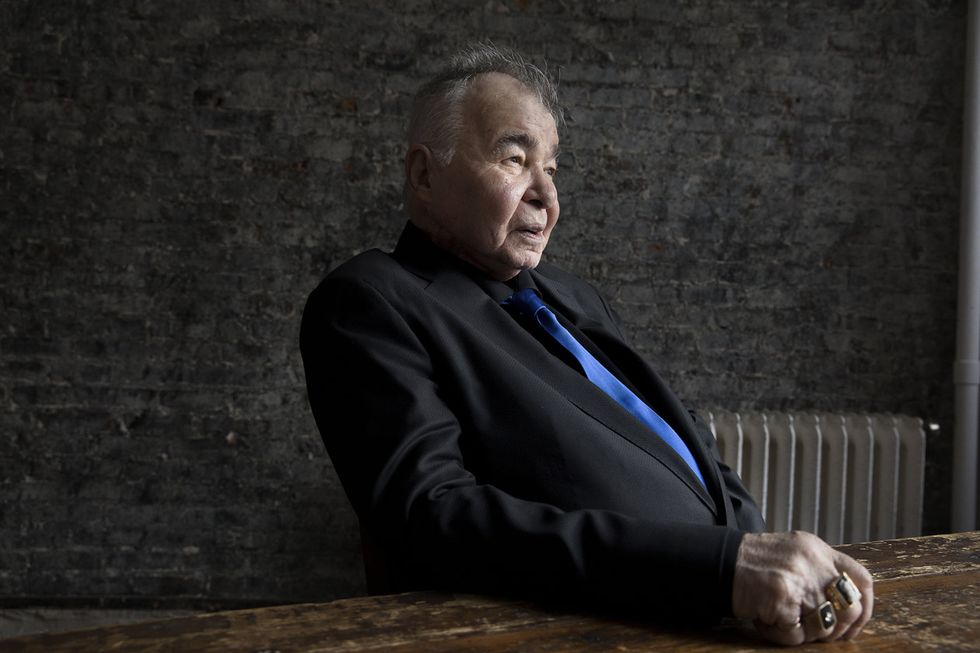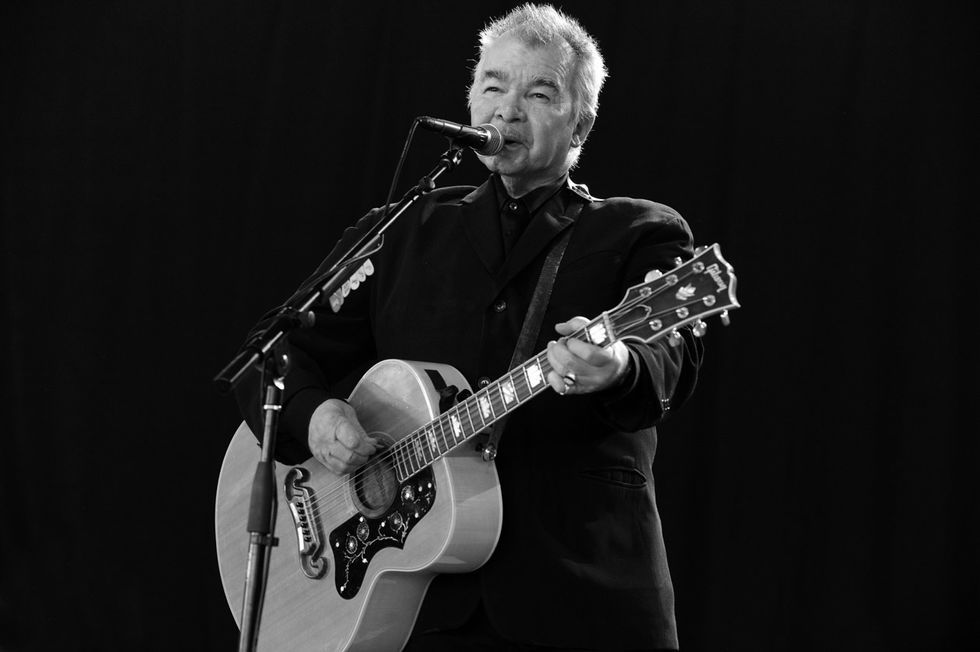When you feel music on a gut level like John Prine does, it’s easy, if not downright tempting, to let yourself be consumed by it. A genuine American proponent of the troubadour’s creed in the mold of Bob Dylan, Neil Young, Kris Kristofferson, and Guy Clark, Prine has stuck with his calling, through thick and thin, whether loaded or lean, for nigh on six decades.
But like his vaunted contemporaries, he seems to have always drawn strength and inspiration from the lonely rigors of life on the road. Prine’s world is teeming with colorful stories—some of them hilariously funny, some humble and salt-of-the-earth, and some deep, dark and mystical—and they’re populated with characters who feel the weight of circumstance, like the broken Vietnam vet of “Sam Stone” or the mournful spinster of “Angel from Montgomery,” but who also find enjoyment in everyday life, whether they’re blowing up the TV in “Spanish Pipedream” or strolling hand-in-hand on a moonlit beach in “Let’s Talk Dirty in Hawaiian.”
Prine is in the midst of a spectacular late-career renaissance. Last year he released Beyond Words, an artfully crafted anti-autobiography packed with photos, chord charts, song lyrics, and pithy anecdotes. In August 2017, he reissued the outstanding concert recording September 78 on his Oh Boy Records imprint, and then he won the Americana Award for Artist of the Year.
As music critic and writer David Fricke has put it so eloquently, “John Prine writes songs with a poet’s eye for color and metaphor, a stand-up comedian’s ear for wordplay and drop-dead timing, and a born raconteur’s love of a good yarn.” Add to that a lifetime traveler’s knack for paring down to the essentials, and you have a taste of what drives the music on The Tree of Forgiveness, Prine’s first album of new songs since 2005’s Fair & Square (which took the Grammy—his second, after five nominations going back to 1973—for Best Contemporary Folk Album). Produced with reverence and loving care by Dave Cobb at Nashville’s recently restored RCA Studio A, the 10-song set captures Prine at his storytelling best, and features co-writing from Pat McLaughlin, Roger Cook, Keith Sykes, the Black Keys’ Dan Auerbach, and Phil Spector (the latter on the long-shelved inspirational “God Only Knows”). It’s also brimming with stellar support performances by Brandi Carlile, Jason Isbell, and Amanda Shires, and features Cobb sitting in on acoustic guitar with Prine’s longtime backing band of McLaughlin (guitar, mandolin), Jason Wilber (lead guitar), Dave Jacques (bass), and Kenneth Blevins (drums).
Of course, this wouldn’t be a John Prine album if the very making of it didn’t itself have a story behind it. To get into the writing mood, Prine checked into the Omni Hotel in Nashville with four guitars and a stack of legal pads, and spent a week doing what he’s done best on the road for most of his life.
“I can honestly write anywhere,” he says. “Driving alone in the car has always been a good writing place for me—[but] after being on the road so many years, I function better in a hotel. No pressure. This way, if I wanted to write at three in the morning or three in the afternoon, I could. It worked out, because by the end of the week, I was ready to go into the studio.”
With a dry, no-frills sound that channels the immediacy and intimacy of the performances—many of which come across as though they were recorded live from the studio floor—the album highlights the deceptive simplicity of Prine’s chord structures, as well as his dynamic touch on the acoustic guitar, whether he’s strumming hard or lightly fingerpicking. It’s also testament to Cobb’s attention to detail as a producer; on most of his recent work with Nashville’s youngbloods (Chris Stapleton, Brandi Carlile, Sturgill Simpson, and Jason Isbell, in particular), he consciously takes a page from how rock records are made, but with Prine he seems to be looking back to the “outlaw sound” of albums like Willie Nelson’s Red Headed Stranger or Waylon Jennings’ Honky Tonk Heroes.
For his part, all Prine asks of an acoustic guitar is that it feels good in his hands and makes a sound that moves him. Over the years, he’s owned everything from Gibson J-200s to Hummingbirds, as well as Guilds (the D35-NT and, more recently, the JF-100), Collings dreadnoughts, and multiple Martins. But his most prized possession is the 1968 Martin D-28 he’s played throughout his career.

To get into the writing mood for his new album, Prine checked into the Omni Hotel in Nashville with four guitars and a stack of legal pads. He recorded Tree of Forgiveness at Nashville’s historic RCA Studio A with producer Dave Cobb.
“That one has been with me a long long time, and I’ve written almost every song on that guitar,” he says. “I recently made the decision to retire it from the road. It’s still a great guitar, but it’s vulnerable to the demands of touring and traveling.” In recognition of Prine’s commitment, Martin introduced a signature edition D-28 early last year. “It’s just the sound you hear when you strum those first few chords. It’s difficult to put in words, but it’s the warmth of the wood and how the guitar responds to my particular style of fingerpicking. But I do use different guitars to play and hear different things. With rhythm guitar, for example, I like a big, boomy sound.”
Song-by-song, The Tree of Forgiveness plays like a travelogue not just of Prine’s lifelong love affair with the guitar (which he first picked up as a teenager to accompany his older brother, David, who at the time was teaching himself to play fiddle), but, more poignantly, of his deep understanding of human frailties, vulnerabilities, and desires. It comes through in the wry, rueful picture he paints to open the otherwise summery-sounding “Knocking on My Screen Door” (“I once had a family, but they up and left me with nothing but an 8-track—another side of George Jones”), or the laugh-out-loud escapades he recounts in the future-barroom-singalong “Crazy Bone” (“When you got hell to pay, put the truth on layaway…”). The mournful “Caravan of Fools” suffers none as Prine, alone with his guitar, balefully envisions the end times, with only “love and devotion, deep as any ocean” standing in the way. He closes out the album with “When I Get to Heaven,” a look ahead to the afterlife and a look back down a path well-navigated. A cancer survivor, Prine has undergone two surgeries to his neck and lung; the first one, in 1998, dropped his voice to a deeper, more gravely register that he settles into now almost matter-of-factly. That he can look at the dodged bullet with humor speaks volumes to how so many people, from all walks of life, can relate to his music.
John Prine has used many acoustic models, including Gibson J-200s like this one. But his all-time favorite is his D-28, which is now retired from the road. Martin released a Prine signature D-28 in 2017. Photo by John Kurc
“Well, most everything in life has a humorous aspect to me,” Prine observes. “Even the most tragic of situations—the most human of situations—will have a humorous bent, or at the very least be absurd or ridiculous.” Just to accentuate the point, the song’s second verse, which he delivers in a jaunty sung-spoken tone while his grandson frolics happily in the background, is vintage Prine:
Then as God is my witness
I’m getting back into show business
I’m gonna open up a nightclub
Called the Tree of Forgiveness
And forgive everybody
Ever done me any harm
Why, I might even invite a few choice critics
Those syphilitic parasitics
Buy ’em a pint of Smithwick’s
And smother ’em with my charm
“For me, there’s no rule of thumb when it comes to songwriting,” Prine continues. “Anything goes. Sometimes it’s the truth or sometimes it’s just a convenient lie that rhymes. And I typically don’t go searching for a song. When the idea comes, sometimes I’ll sit and write the whole thing, and other times it remains an idea for a very long time. But I like to think that I go as deep as the song dictates. I don’t ever decide ahead of time how much or how little I’ll dig. I just keep going until the story has been told.”
He brought a similar approach to assembling all the materials for Beyond Words, the scrapbook-sized collection of personal photographs, song lyrics, and mementos he released last year to widespread acclaim—and widespread relief to many Prine fans, who’d been begging for a personalized songbook for what seemed ages. “I didn’t care for the other songbooks that Warner had put out,” he says. “I don’t read music, so I don’t know if those are my songs or ‘White Christmas’! So we chose the songs that I sing every night onstage—the songs that my fans request over and over. I thought the chord change written above the words would be just what they deserve. We wanted to make it so beginners on up could learn and sing my songs, and I think what they have here represents just about every decade of my career.”
As tantalizing as it is to have so many of Prine’s songs collected in one book and ready for the learning, the photographs themselves tell a compelling story about his creative partnership with fellow musician Steve Goodman—not just Prine’s best friend, but his most trusted producer as well.
“We started out together in Chicago and got our first album deals together,” Prine recalls fondly. “We had the same manager, Al Bunetta, for years. Steve knew me, and as a producer he knew that I needed a strong hand, because I can get distracted very easily! He knew me musically because he sang those songs with me, too. Steve was very conscientious in the studio. He just wanted to get the best record he could as soon as he could, because I had already spent way too much time trying to get it done. It was a big loss for his family, his fans, and for me and Al when he died. He was the life and soul of every gathering—a little guy with a huge heart and a massive personality.”
Now a youthful 71, Prine has come a long way from his Midwestern roots in the Maywood suburb of Chicago. Since moving to Nashville in the early ’70s, he’s gradually become an iconic fixture in a town where he didn’t always feel like he fit in. And he clearly enjoys his informal role as mentor to a younger generation of singer-songwriters; besides his long-standing friendships with Jason Isbell and Sturgill Simpson (who joins him on tour for a limited run of shows this spring), Prine cowrote the title cut to Dan Auerbach’s recent solo album Waiting on a Song, and in late 2016, he released For Better, or Worse—an album of duets featuring Lee Ann Womack, Alison Krauss, Susan Tedeschi, Kacey Musgraves, and longtime collaborator Iris DeMent. The memorable set was the deciding factor in the Americana Music Association’s recognition of Prine as its 2017 Artist of the Year, and cemented his standing as a Nashville treasure—not that it was ever in question.
His connection with Isbell runs especially deep. “God Only Knows,” a gospel-tinged rocker that Prine co-wrote many years ago with Phil Spector, is one of the standouts on The Tree of Forgiveness, and features Isbell on slide guitar and background vocals, which he shares with his wife Amanda Shires, who also plays fiddle on the song. While on tour last year at New York City’s Beacon Theatre with Shires and his band the 400 Unit, Isbell paused between songs to show the audience a beautiful 1980 Gretsch White Falcon double-cutaway guitar that Prine had gifted to him for Father’s Day.
“I bought the guitar because it looks so good and it had a whammy bar on it,” Prine explains. “When I got up in the morning, I’d hit a big fat E chord and then hit the Bigsby like I was Duane Eddy! Jason really liked the guitar when he saw it, and he knows how to play it, so I surprised him for Father’s Day and gave it to him. He’s a great guy and a great dad.” Prine’s admiration extends to Isbell’s talents as a songwriter, too. “Jason has a way of telling a story by painting vivid pictures with just the right amount of words. I was immediately taken with his songwriting when I heard Southeastern for the first time.”
His appreciation recalls the praise of another great songwriter who was bowled over when he encountered a young John Prine for the first time back in 1971 in Chicago. A few months later, at a now-shuttered North Side club called the Quiet Knight, the shaggy-haired older musician, who’d written a hit for Janis Joplin just the year before, stood up to introduce Prine to an expectant audience. “No way somebody this young can be writing so heavy,” he said in a familiar Texas drawl. “John Prine is so good, we may have to break his thumbs.”
Fortunately for us, Kris Kristofferson smiled, stepped back, and let him play.
John Prine dedicates this recent performance of “Souvenirs” to his best friend, folk musician and producer Steve Goodman, who died of leukemia in 1984.
John Prine recently visited National Public Radio’s Tiny Desk concert series to play four song: “Caravan of Fools” and “Summer’s End,” from his new The Tree of Forgivness, and his classics “Souvenirs” and “All the Best.”


















![Rig Rundown: Russian Circles’ Mike Sullivan [2025]](https://www.premierguitar.com/media-library/youtube.jpg?id=62303631&width=1245&height=700&quality=70&coordinates=0%2C0%2C0%2C0)
















![Rig Rundown: AFI [2025]](https://www.premierguitar.com/media-library/youtube.jpg?id=62064741&width=1245&height=700&quality=70&coordinates=0%2C0%2C0%2C0)











